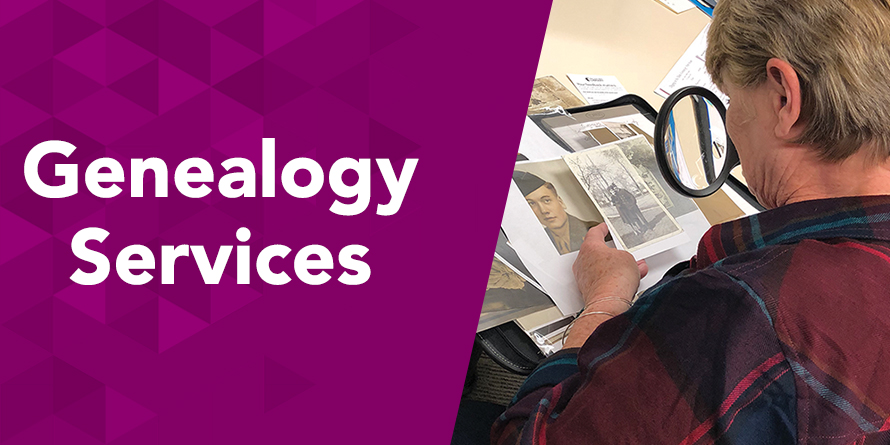Are you a royal descendant? Did your great-great-great-uncle invent sliced bread? Did your family immigrate from Siberia? Find out!
October is Family History Month! If you’re digging into your roots, you might want to start with our awesome Genealogy Department. Our experts love to research and will help you access databases including Ancestry.com, court records, the federal census, and other resources to find clues—for FREE!
What are you waiting for? Everyone has roots— here are a few simple steps to start unearthing yours:
Ask!
Your parents, grandparent, and great aunts and uncles are a wealth of information. Not only will you get the names you need to really dig into your research, but you’ll discover personal family memories and details that would otherwise be lost to time. Grab a pen, camera, or tape recorder, and start listening.
You might learn that your great-great-aunt loved to chew clove gum, hear all about the time your grandma fell into a well, or find that your grandfather was a professional hockey player from Ireland. They may even have old photographs! (Speaking of photos, you might like checking out our collection of historical pictures in Stark Story.)
Fill out your pedigree chart.
A pedigree chart tracks your individual family history back through time. This means that every person listed on the chart is directly related to you: you as the focus individual, your parents, their parents, and so on—usually going back six or seven generations.
You may be wondering how this differs from a family tree. In a pedigree chart, only your direct ancestors are listed, while a family tree shows all of those people who are omitted from the pedigree chart, such as aunts, uncles, cousins, great aunts, and uncles, etc.
Set a goal.
What do you hope to discover? How far back do you want to search? What do you plan to do with the information? Make a list of the missing pieces and choose a few goals or questions to research. Maybe a specific family member has caught your interest and you want to dig in deeper. Focus on one genealogical question at a time –setting clear goals will help you stay on track and focus your research.
Write it down!
Keep detailed records of everything you find or know, including what you found, where you found it, what your source was, who you talked to— everything. If you have to backtrack, this tip will be a real time-saver. You can thank us later.
Search databases!
There are a lot of helpful online family research resources, and you can access most of them FREE with a library card, including the popular Ancestry.com. You can also search historical news articles, military service, court, immigration, and census records.
There are databases for most topics, including more complex research challenges. African American Heritage is a database especially focused on African Americans. It includes freedman and slave records, census records, vital records, church records, and more to address the unique challenges of African American family history research.
Ask your librarian for help.
We weren’t kidding when we said librarians love to research. We’ll help contact other libraries to chase a paper trail or direct you to other helpful resources. You make an appointment for one-on-one research help, call for information, or use our online request form for information.
Be prepared to discover some secrets!
Sure, you could discover that your long-lost great aunt Gertrude is an heir-less billionaire, or that you are related to the Duchess of Cambridge on your mother’s side, but you could also uncover some skeletons in the closet. Sometimes you discover a whole new branch of your family tree (true story)…
One researcher discovered that the (now deceased) family patriarch had a secret family he had abandoned decades earlier—we’re talking wife and kids— living not even 50 miles away! They were excited to be reunited with an aunt they never knew existed, and learn priceless new stories and histories.
Regardless of what you find in your search, we’d love to help you get started! Be sure to check out all of the resources available through your local library before paying expensive subscription fees. Best of luck in your search!


